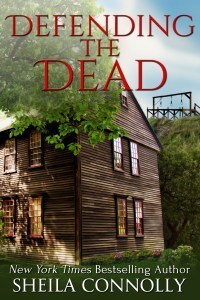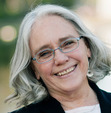Edith Maxwell's Blog, page 260
May 5, 2015
Happy Book Birthday Barbara Ross!
 YAY! The third Maine Clambake mystery is out! Happy Book Birthday Musseled Out.
YAY! The third Maine Clambake mystery is out! Happy Book Birthday Musseled Out.
Here’s a bit about the book: The busy summer tourist season is winding down in Busman’s Harbor, Maine, but Julia Snowden senses trouble simmering for the Snowden Family Clambake Company. Shifty David Thwing–the “Mussel King” of upscale seafood restaurants–is sniffing around town for a new location. But serving iffy clams turns out to be the least of his troubles. . .
When Thwing is found sleeping with the fishes beneath a local lobsterman’s boat, the police quickly finger Julia’s brother-in-law Sonny as the one who cooked up the crime. Sure, everyone knows Sonny despised the Mussel King. . .but Julia believes he’s innocent. Proving it won’t be easy, though. It seems there’s a lot more than murder on the menu, and Julia needs to act fast. . .
Wickeds, what do you love most about this series?
Julie: Barb really nails the setting in Maine, and I love that. It is such a unique part of the country, and I feel like she gives us a real taste of it. I also love the cover art. A LOT.
Sherry: They just keep getting better, Barb! I love Mussled Out — the climactic scene is so exciting I held my breath! And can’t wait for number four!
Edith: I love the characters. Julia Snowden with her conflicts about coming home. Gus and his no-nonsense approach to life. Her sister, Livvie, and their mom. The somewhat mysterious hunk of a love interest. And everybody else – deeply drawn, intriguing, everybody with some conflict. Just like real people. Can’t wait to read it, Barb!
Jessie: My great-grandparents were lobstermen and when I was a child we visited them once a month. They’ve been gone now for many years but because of the setting and the family focus,when I read these books I feel a bit like I am having a visit with them once more. Thanks, Barb!
Liz: I love this series!! I used to spend a lot of time in Maine and these books are like memories. Can’t wait to read it Barb!
Barb: Thanks all! I so appreciate your book birthday wishes, I really do. But my favorite, favorite book birthday wishes are from the little girl below. You can understand that, right?
Readers: What’s your favorite part of the series?
Filed under: Book Release Tagged: Boothbay Harbor Maine, clambakes, Kensington Publishing, maine, musseled out


May 4, 2015
The Poem You Can’t Forget
by Sheila Connolly
The lovely poem that Edith cited here not long ago reminded me of another poem which seems particularly appropriate for writers. It’s a villanelle by Sylvia Plath, called “Mad Girl’s Love Song.” It’s always stuck in my mind because of one of the recurring lines (as in Edith’s poem), “(I think I made you up inside my head.”) Yes, the parentheses are part of the line as Plath wrote it.
In case you’re wondering, a villanelle is: a nineteen-line poetic form consisting of five tercets followed by a quatrain. There are two refrains and two repeating rhymes, with the first and third line of the first tercet repeated alternately until the last stanza, which includes both repeated lines. (Never heard of a tercet. For us simple folk it’s three lines together.) It’s clearer when you see it on a page than in the definition.
In college my daughter, who had never been much of a reader in high school, somehow morphed into an English major, combining contemporary literature and Old English literature, a double major that no one had ever attempted. She became involved in the campus poetry organization, which hosted visiting poets (she met Seamus Heaney once, and on another occasion my husband and I attended an event where Gary Snyder spoke and marveled at the red velvet cake that my daughter had made for the event—apparently he’d never seen one before.)
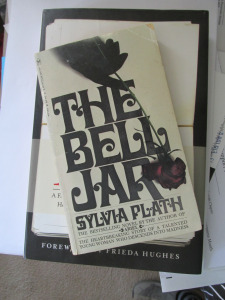
My original copy
Sylvia Plath attended the same college as my daughter, so she still has a presence there. She occupies an interesting place in contemporary writing. I read The Bell Jar just after college myself (and I still have that copy, a 7th printing from 1972), my daughter a generation later (the same copy, I think). Together we made a pilgrimage to the Massachusetts house which Plath immortalized when she tried to kill herself under the porch (as described in The Bell Jar; yes, we found it, and it’s not far from the similarly bland suburban house where poet Anne Sexton did manage to commit suicide in the garage. Apparently the combination of poetry and Massachusetts can be toxic, although Heaney survived at Harvard for a while.). Plath’s life was brief and dramatic, and that colors this poem.
The other recurring line in Plath’s villanelle is “I shut my eyes and all the world drops dead.” (No parens this time.) To me the two lines, alternating, say a lot about how we as writers think: We make up worlds in our heads. When we shut our eyes, we see those imaginary worlds, not the real one we live in. If we’re lucky and/or skilled, we can set those worlds on a page and makes others see them too.
Plath’s real world proved to be too much for her. Is it depression when a writer can no longer tell where the line between imagination and reality lies? Or when the internal images become more frightening than the reality, or conversely, not enough to offset the grimmer reality?
Maybe that’s why we write cozies. We can create imaginary worlds where there is little violence, plenty of nice, helpful, kind and supportive people, and always a happy ending. Is this fantasy? Of course it is. But it makes people happy. And what’s wrong with that?
Are there any lines from a book or a poem that you’ve never been able to forget?
And now for a bit of self-promotion: my latest book, Defending the Dead, the third in the Relatively Dead series. My protagonist Abby Kimball, who sees through the eyes of her ancestors, decides to take on the witchcraft trials in Salem. That’s a subject I had always wanted to find time to explore myself–and I think a lot of people have failed to understand it. You may find some surprises.
Available in e-format from Amazon, Barnes and Noble, and iBookstore.
Filed under: Sheila's Posts Tagged: sheila connolly

May 1, 2015
The Wickeds Do Malice
Malice Domestic is a great conference, and most of the Wickeds will be there! We are THRILLED that two of our own are nominated for Agatha awards (Edith for Best Short Story and Sherry for Best First Novel). We will be on social media all weekend, so make sure to follow us on Facebook or on Twitter.
Here’s our schedule, but we’ll also be around all weekend. Please stop any one of us and say hello! We love meeting people in 3-D. If you see our Fan of Honor, please pose with her as well.
Friday
10:00-11:45—Malice Go Round. Liz will be representing the Wickeds at this fun event! Haverford Baccarat
1:00-1:50—New Kids on the Block: Our Agatha Best First Novel Nominees panel—Sherry—Waterford/Lalique
5:00-5:30—Opening Ceremonies—Waterford/Lalique room Sherry and Edith will get their certificates–we wouldn’t miss that!
7:30—Charity auction. The Wickeds have a basket in the Silent Auction.
Saturday
7:30-9:00—SinC Breakfast
9:00-9:50 Edith on Make It Snappy: Our Agatha Best Short Story Nominees panel
10:00-10:50—Susannah on the It’s All Relative: Dysfunctional Families panel
2:00—2:50 Julie moderates the Knit One, Murder Too: A Crafty Compendium of Craft-Based Mysteries panel
7:00 Banquet—Chrystal Ballroom
Sunday
7:00-8:45—New Authors breakfast. Sherry introduced.
9:00-9:50—Jessie on Population 2000: Small Town Sleuths panel.
11:45-12:35—Sheila on Bright Lights/Starry Nights: Big City to Small Town Sleuths panel. Liz on Murder’s on the Menu: Food and Mysteries panel.
There are, of course, dozens of authors at Malice Domestic. Here’s the rest of the schedule. We are excited about being in Bethesda this weekend–we’ll let you know how it went really soon!
Filed under: Uncategorized Tagged: Malice Domestic

April 30, 2015
Celebrating Two Wicked Years!
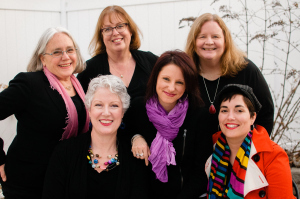 It seems impossible that two years have passed since we started Wicked Cozy Authors. Our very first post was about how we met. For our first year anniversary we interviewed each other. We’d like to say how grateful we are for all our fabulous readers and our regular commenters. Thank you! We love you! And we are each going to give away a book (or perhaps a mug) to six commenters today. So this year Wickeds, tell us one thing that has changed for you this year and one thing you don’t think the other Wickeds know about you.
It seems impossible that two years have passed since we started Wicked Cozy Authors. Our very first post was about how we met. For our first year anniversary we interviewed each other. We’d like to say how grateful we are for all our fabulous readers and our regular commenters. Thank you! We love you! And we are each going to give away a book (or perhaps a mug) to six commenters today. So this year Wickeds, tell us one thing that has changed for you this year and one thing you don’t think the other Wickeds know about you.
Sherry: My dream of getting published became a reality last December but it took awhile to sink in. I think because I know so many authors who are published it didn’t seem like a huge deal. About a month ago I was sitting on the couch with my husband one evening and I thought, “I’m published. I AM PUBLISHED.” What don’t the Wickeds know about me —-hmmm. When I was the Director of Marketing for a financial planning company I did weekly stock market reports on a local radio station. I have a good radio voice — which is very different from my regular voice.
Edith: What a fabulous path we’ve been on together! And Sherry, I want a demo of your announcer voice while we’re in Bethesda! For me, in the last year my Local Foods Mysteries contract was extended for two more books, and I landed both the Country Store Mysteries contract and the Quaker Midwife Mysteries contract. This change is both terribly exciting, and very stressful. So far, the books are still flowing out of my fingers. But I have some pretty tight deadlines next year. Gulp. Something you don’t know about me: I was the first human voice to be  recognized by one of the first commercial speech recognition companies. Thirty-one years ago I was employee #16 for Kurzweil Speech Systems (the stars of which finally landed with Nuance, of Dragon Naturally Speaking), and I recorded 8000 words twice. I was the only person the system recognized, so I did all the demos and traveled to conventions. Not the best use of a PhD in linguistics, but it was fun. (Somewhere I have a picture of me that appeared in something like Newsweek!)
recognized by one of the first commercial speech recognition companies. Thirty-one years ago I was employee #16 for Kurzweil Speech Systems (the stars of which finally landed with Nuance, of Dragon Naturally Speaking), and I recorded 8000 words twice. I was the only person the system recognized, so I did all the demos and traveled to conventions. Not the best use of a PhD in linguistics, but it was fun. (Somewhere I have a picture of me that appeared in something like Newsweek!)
Jessie: My experience over the past year has been similar to Sherry’s. I’ve been published since 2010 but I work at home and five years ago I had children that were younger and needed more from me. I also had fewer work obligations like speaking engagements or teaching commitments. Over the past year I have come to realize this writing gig is an actual job and that I am a professional writer. I don’t know why it has taken so long for this to feel real but I am enjoying thinking about myself in a new way. As to what the Wickeds might not know about me? Perhaps it’s that before my youngest child was born I was a garden designer.
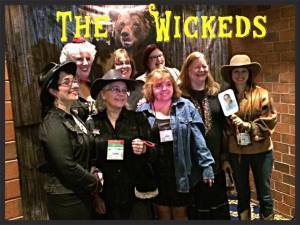 Liz: This past year has been amazing for me also. My Pawsitively Organic Mysteries have been extended for three more books, and I have a new series under contract also that will be out in 2016. Truly blessed, if not stressed! What the Wickeds don’t know about me: I did some radio during my journalism stint. I was the special guest the morning after every city council meeting to talk about what was going on in town. At the time I didn’t care for it, but now I appreciate what it taught me!
Liz: This past year has been amazing for me also. My Pawsitively Organic Mysteries have been extended for three more books, and I have a new series under contract also that will be out in 2016. Truly blessed, if not stressed! What the Wickeds don’t know about me: I did some radio during my journalism stint. I was the special guest the morning after every city council meeting to talk about what was going on in town. At the time I didn’t care for it, but now I appreciate what it taught me!
Julie: This past year I met my first deadline, and am plugging away on the details surrounding Just Killing Time getting published October 6. I was also co-chair of the New England Crime Bake, a job which I have again this year. It has been a wonderful year in my writing life, that’s for sure. What the other Wickeds don’t know about me? I love cotton candy. LOVE IT.
Barb: Is today really the day? Because two years ago today, something extra special happened, I became a grandmother for the first time to an absolutely amazing baby girl. It’s been a great year professionally. I handed in Musseled Out in July and the Maine Clambake series was renewed for three more books in August. At Level Best Books, we published Best New England Crime Stories 2015: Rogue Wave in November. As to what you don’t know about me, seriously after all these years of blogging, I don’t have any secrets left.
Readers: What’s something about yourself you think we don’t know? Remember, we are going to give away a book (or perhaps a mug) to six commenters today.
Filed under: Group posts Tagged: Dragon Naturally Speaking, garden design, Kurzweil Speech Systems, Nuance, Quaker Midwife Mysteries, Ray Kurzweil

April 29, 2015
Wicked Wednesday: Sports — love em or leave em?
Anyone who has lived in New England knows the four seasons, Bruins, Celtics, Red Soxs and Patriots. Wickeds, do you follow sports? Have a favorite sport? Have a favorite team? (If any of you say the Yankees you’ll immediately be tossed out on your ear…)
Liz: I am so NOT a sports girl. Of course, I’ll root for the New England teams, celebrate wins and lament losses. But ask me to watch? No thanks. And if I hear one more sports analogy at work….
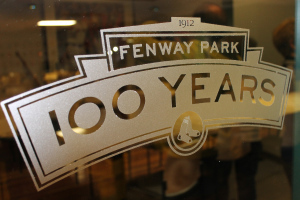 Barb: When I moved to New England, I was so naive, I thought baseball was played once a week, like football. I’m more educated now, thanks to my Red Sox-loving husband. I love Fenway Park. There is no place like it on a summer evening. And baseball on the radio while I read on a summer night. Same with a Patriots open practice on a summer evening. But don’t ask me to watch sports on TV. It shrinks down the spectacle. (I feel the same way about opera.) I will, however, ardently defend the local teams in any situation where they need defending. That’s what being a New England fan means.
Barb: When I moved to New England, I was so naive, I thought baseball was played once a week, like football. I’m more educated now, thanks to my Red Sox-loving husband. I love Fenway Park. There is no place like it on a summer evening. And baseball on the radio while I read on a summer night. Same with a Patriots open practice on a summer evening. But don’t ask me to watch sports on TV. It shrinks down the spectacle. (I feel the same way about opera.) I will, however, ardently defend the local teams in any situation where they need defending. That’s what being a New England fan means.
Jessie: I only watch the Olympics and the World Cup. And really, I only watch those because I like to create regionally themed snacks. For me, the highlight of the games is to plan menus to celebrate the food cultures of the opposing teams. If Korea was playing Sweden I might make Kimbap and Smorgastarta. I’m already planning for coxinhas and caipirinhas when the Olympics are in Brazil in 2016!
 Sherry: Bob and I will be up to watch the Olympics with you Jessie! I love sports. Growing up in Iowa it was all Cubs, Cardinals, and Bears. I live in Colorado when John Elway joined the Broncos and I fell in love with them. When we moved to Massachusetts I went to my first hockey game expecting to hate it but enjoyed the game. And there is nothing like a game at Fenway. My husband has me hooked on English Premier league soccer. Go Manchester United.
Sherry: Bob and I will be up to watch the Olympics with you Jessie! I love sports. Growing up in Iowa it was all Cubs, Cardinals, and Bears. I live in Colorado when John Elway joined the Broncos and I fell in love with them. When we moved to Massachusetts I went to my first hockey game expecting to hate it but enjoyed the game. And there is nothing like a game at Fenway. My husband has me hooked on English Premier league soccer. Go Manchester United.
Edith: I’m not a sports fan. Neither my father nor my brother was interested in any sport as I grew up, and definitely not my mom or my sisters, although my grandparents would follow the World Series, and as a high-achieving student in high school, I won a ticket to see Sandy Koufax pitch at Dodger Stadium in Los Angeles. But I live with a Red Sox fanatic, and I apparently raised one, too, so how can I not follow baseball with them? Funny, Barb, for years listening to baseball on the radio was just noise to me. I couldn’t even figure out what they were saying. The last time the Sox were in the World Series, though, I was driving home from Boston alone during a game and I turned on the game. Lo and behold, it suddenly made sense!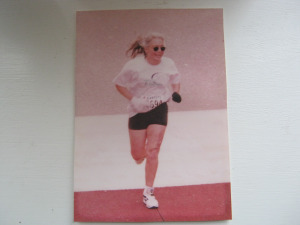
I love watching the Olympics, but my annual sport is following, anticipating, and watching the Boston Marathon. I even ran it (with a charity number) in 1986, finishing in 5 hours 16 minutes. Accomplishment of a lifetime! (Although if I win the Agatha Saturday night, those two will come close to a tie.)
Julie: I am a HUGE Red Sox fan. Huge. I love baseball season, and games are often the background music to my writing.
Readers: What’s your sport? Micro-local, regional favorite, or national team? Or maybe your sport is more on the order of lifting a margarita on the deck while reading the latest cozy mystery? We want to know!
Filed under: Wicked Wednesday Tagged: Bears, Boston Marathon, Broncos, caipirinhas, Cardinals, coxinhas, Cubs, Dodgers, English Premier league soccer, kimbabp, Manchester United, olympics, Sandy Coufax, smorgastarta, world cup

April 28, 2015
Welcome Back Chrystle Fiedler, Author of the Natural Remedies Mysteries!
Liz here, welcoming back Chrystle Fiedler, who writes the Natural Remedies Mysteries. Garden of Death is her latest – and she’s giving away two copies of the book to commenters!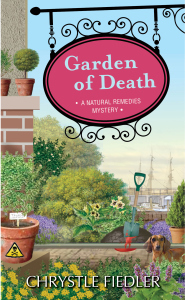 You all know me and my obsession with everything natural, healthy and organic, so naturally I love these books. Flowers are one natural healing area I don’t know well, so I’m delighted Chrystle’s stopping by to share her knowledge. Take it away, Chrystle!
You all know me and my obsession with everything natural, healthy and organic, so naturally I love these books. Flowers are one natural healing area I don’t know well, so I’m delighted Chrystle’s stopping by to share her knowledge. Take it away, Chrystle!
Flower Power:
The Gardens of England and Medicinal Plants that You Can Grow and Use!
By Chrystle Fiedler
After a very cold, very white and very long winter on Long Island in New York, I was more than ready for spring to arrive with its warm breezy weather and beautiful blooming flowers and medicinal plants. My passion for flowers comes from my mother, Marion who was always outside tending her garden in the spring and summer. My mother actually grew up down east in East Machias, Maine, so I have a natural connection to all of you Wicked Cozy Authors from New England! I also attended college at Boston University and spent 4 years in Beantown, getting my degree in communications.
In 2008 I planned a trip so that my mother and I could visit the gardens in Englan d. We were to fly over the week after the 4th of July but then she got sick and couldn’t come (she’s okay now!). At the last minute, I decided to go anyway and I’m really glad that I did. I’d been to London before and I feel at home there.
d. We were to fly over the week after the 4th of July but then she got sick and couldn’t come (she’s okay now!). At the last minute, I decided to go anyway and I’m really glad that I did. I’d been to London before and I feel at home there.
 For my first stop, I took the tube to the Hampton Court Flower Show, where I was wowed by the amazing displays and uses of flowers.
For my first stop, I took the tube to the Hampton Court Flower Show, where I was wowed by the amazing displays and uses of flowers.
Here are three of my favorites: 

Even though it was raining it was all so beautiful! The show takes place on the parklands surrounding Henry VIII’s castle right next to the River Thames where I believe that Wolf Hall on Masterpiece was filmed in part.
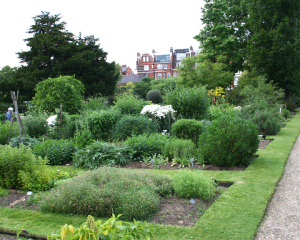
Next I visited the Chelsea Physic Garden in London. Established in 1673 by the Worshipful Society of Apothecaries for its apprentices to study the medicinal qualities of plants, it’s mission is to demonstrate the importance of medicinal and herbal plants to health and well-being. Over 50,000 visitors pass through the gates each year.
I was especially intrigued by the section that featured a variety of plants for different health conditions. 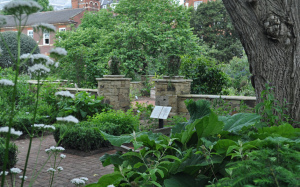 Years later, I was able to put my inspiration to good use, both in my non-fiction, and in latest installment of my natural remedies mystery series, the Garden of Death.
Years later, I was able to put my inspiration to good use, both in my non-fiction, and in latest installment of my natural remedies mystery series, the Garden of Death.
Medicinal plants can be very effective when it comes to common complaints, so here are 5 plants mentioned in the Garden of Death that you may want to consider growing and using. Usually, natural remedies like these are perfectly safe, but it’s best to discuss their use with your doctor first. I hope that you enjoy learning about beneficial plants!
Botanica Name: Aloe barbadensis
Medicinal Uses: Aloe is a handy plant that no household should be without. This juicy, succulent plant features spiky leaves that contain a thick gel that you can use topically to soothe and heal minor burns, sunburns and blisters and prevents scarring. You can also use it for insect bites, rashes, acne and other skin conditions like eczema, poison ivy and poison oak. Place this hardy plant on your kitchen window sill or plant in your garden. Just make sure your aloe plant has sunshine, well-drained soil, and moderate water and then, watch it grow and reap the many benefits it provides!
 Chamomile
Chamomile
Botanical Name: Chamaemelum nobile (Roman chamomile; syn. Anthemis nobilis), Matricaria recutita (German chamomile; formerly Chamomilla recutita; syn. M. chamomilla)
Medicinal Uses: Since the times of ancient Greece, both types of chamomile have been used medicinally in the same ways. Tiny but mighty, chamomile is rich in nerve and muscle relaxing nutrients such as calcium, magnesium, potassium and B vitamins that help promote relaxation, easing stress and anxiety, encouraging the movement of chi or good energy, and promotingsleep. It is has also been approved for use by the pharmacopoeias in many countries to treat inflammation, indigestion, muscle spasms, and infection. Chamomile is a useful herb those that are “bothered by almost everything.”
Garlic 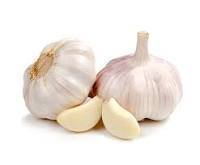
Botanical Name:
Allium sativum
Medicinal Uses: Garlic is an edible bulb from a plant in the lily family, and one of the superstars of medicinal plants. It has been used as both a medicine and a spice for thousands of years. Antiseptic, antibacterial and antimicrobial, garlic stimulates the production of white blood cells, improving immunity and helping to speed healing from colds and flu. There is a reason Grandma’s Chicken soup makes you feel better! Garlic also is effective at lowering high cholesterol and lowers blood sugar levels. You can eat garlic cloves raw if you’re feeling brave or add them to your next soup or stir fry.
Borage
Botanical Name: Borago officinalis
 Medicinal Uses: Borage leaves, flowers, and seed oil can help you feel happier and can even, inspire courage. That’s why in medieval times these flowers were embroidered on the mantles of knights and jousters, Borage was even sneaked into the drinks of prospective husbands to give them the courage to propose!
Medicinal Uses: Borage leaves, flowers, and seed oil can help you feel happier and can even, inspire courage. That’s why in medieval times these flowers were embroidered on the mantles of knights and jousters, Borage was even sneaked into the drinks of prospective husbands to give them the courage to propose!
Borage leaves and flowers have long been used in treatments for anxiety, mild depression, grief, heartbreak and worry. As a flower essence, borage is used to lighten mild depression and ease discouragement. Borage helps bring joy, optimism, enthusiasm, and good cheer, improves confidence, and dispels sadness.
Calendula 
Botanical Name:
Calendula officinalis
Medicinal Uses: Calendula is a hardy, long blooming plant with radiant yellow flowers that will brighten your garden. But there’s more. Calendula also has amazing healing properties. Antiseptic and anti-inflammatory, this flower helps to promote cell repair and growth. You’ll find calendula in many items at your health food store such as lotions, salves and creams that treat everything from cuts and scrapes, to insect bites, varicose veins and Athlete’s foot. Calendula also is a nourishing and cleansing tonic for the lymphatic system, which helps to improve immunity. It also aids digestion, helps to ease throat infections, and is used in children’s ear drops. Inside and out, this is a helpful herb that speeds healing and improves health.
PHYSICIAN, HEAL THYSELF?
Suspicion is unearthed when an outspoken surgeon turns up dead in Willow McQuade’s medicinal herb garden.
A bitter battle has sprouted in the village of Greenport on the eve of the annual maritime festival: Willow McQuade has transformed a vacant lot alongside Nature’s Way Market & Café into a beautiful garden of healing plants—as much a tribute to her late aunt Claire, the shop’s beloved founder, as an enlightening educational center. The town board awarded Willow the plot fair and square, but that’s not how some folks see it—including Dr. Charles White, who invested in plans to develop a high-end hotel on the property. When the belligerent surgeon publicly threatens Willow during the festival, Willow’s boyfriend, Jackson Spade, ratchets up the hostile confrontation to defend the woman he loves, sowing seeds of guilt that take root by the time Dr. White’s corpse turns up amongst Willow’s chamomile and ashwaganda plants. To prove Jackson’s innocence, she must dig deep to bring a killer to light.
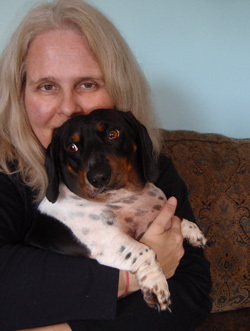 CHRYSTLE FIEDLER is the author of the previous Natural Remedies mysteries, Scent to Kill, and Death Drops, as well as six nonfiction books on natural healing and herbal remedies. Also a freelance journalist specializing in alternative health topics, her work has appeared in Natural Health, Spirituality & Health, Mother Earth Living, Green Living, Better Homes & Gardens, Prevention, Vegetarian Times, and Remedy. She lives in Greenport, New York with her 3 dachshunds and 2 cats, three of which are rescues. Visit www.chrystlefiedler.com, or follow her on Facebook, and Twitter.
CHRYSTLE FIEDLER is the author of the previous Natural Remedies mysteries, Scent to Kill, and Death Drops, as well as six nonfiction books on natural healing and herbal remedies. Also a freelance journalist specializing in alternative health topics, her work has appeared in Natural Health, Spirituality & Health, Mother Earth Living, Green Living, Better Homes & Gardens, Prevention, Vegetarian Times, and Remedy. She lives in Greenport, New York with her 3 dachshunds and 2 cats, three of which are rescues. Visit www.chrystlefiedler.com, or follow her on Facebook, and Twitter.
Readers, any experiences with flowers as remedies? Leave a comment below for a chance to win a copy of Garden of Death!
Filed under: Guest posts Tagged: Chelsea Physic Garden, Chrystle Fiedler, flowers, Garden of Death, gardens, healing, herbs, London, Natural Remedies Mysteries

April 27, 2015
Welcome Back to the Agatha-Nominated Lea Wait!
by Barb who is busy rounding up her stuff to pack for Malice.
 In the past several months, Lea Wait has visited the Wicked Cozies twice, once for her Shadows Mysteries and once for her new Mainely Needlepoint series.
In the past several months, Lea Wait has visited the Wicked Cozies twice, once for her Shadows Mysteries and once for her new Mainely Needlepoint series.
Now she’s back to tell us about her Agatha-nominated novel for children, UNCERTAIN GLORY. I love this book, and I also wanted to ask Lea some questions about the mysterious (for me) world of writing for children.
Here’s the blurb for UNCERTAIN GLORY.
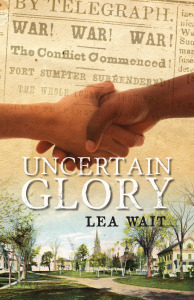 Joe Wood has dreams. Big dreams. He wants to be a newspaperman, and though he’s only fourteen, he’s already borrowed money to start his own press. But it’s April, 1861, and a young nation is teetering on the brink of a civil war. As effects of war begin to spread over Joe’s hometown of Wiscasset, Maine, he must juggle his personal ambitions with some new responsibilities. He has to help Owen, his young assistant, deal with the challenges of being black in a white world torn apart by color. He needs to talk his best friend, Charlie, out of enlisting. He wants to help a young spiritualist, Nell, whose uncle claims she can speak to the dead. And when Owen disappears, it’s up to Joe to save him. Lea Wait skillfully draws on the lives of real people in Maine’s history to tell this story of three young adults touched by war and the tension it brings, forcing them into adulthood—before they may be ready.
Joe Wood has dreams. Big dreams. He wants to be a newspaperman, and though he’s only fourteen, he’s already borrowed money to start his own press. But it’s April, 1861, and a young nation is teetering on the brink of a civil war. As effects of war begin to spread over Joe’s hometown of Wiscasset, Maine, he must juggle his personal ambitions with some new responsibilities. He has to help Owen, his young assistant, deal with the challenges of being black in a white world torn apart by color. He needs to talk his best friend, Charlie, out of enlisting. He wants to help a young spiritualist, Nell, whose uncle claims she can speak to the dead. And when Owen disappears, it’s up to Joe to save him. Lea Wait skillfully draws on the lives of real people in Maine’s history to tell this story of three young adults touched by war and the tension it brings, forcing them into adulthood—before they may be ready.
Barb: Lea, all your historical fiction for young people takes place in or involves the town of Wiscasset, Maine. Why did you decide on this unifying sense of place? And how do you use it in your books?
 Lea: I’ve always been fascinated by places. How different they are, and, most important, what stays the same (mountains, rivers, rocks) and what changes (the way people live – their homes, occupations, how they think of their environment). When I sit on the rocky shore of Maine I know I’m sitting on the same rocks people sat on hundreds – perhaps thousands – of years ago.
Lea: I’ve always been fascinated by places. How different they are, and, most important, what stays the same (mountains, rivers, rocks) and what changes (the way people live – their homes, occupations, how they think of their environment). When I sit on the rocky shore of Maine I know I’m sitting on the same rocks people sat on hundreds – perhaps thousands – of years ago.
Who were they? What were they thinking
So I wanted to write a group of books that reflect one place, over time. I chose the town of Wiscasset, Maine, and so far have had five books published that take place in the 19th century there – in 1806, 1804-1807, 1819-1820, 1838 and, in UNCERTAIN GLORY, 1861. Many of the characters in these books actually lived in 19th century Wiscasset, and many events in the books took place there.
Barb: In UNCERTAIN GLORY your main character, Joe Wood, faces many conflicts and responsibilities that today would be considered adult. How do your young readers react to this? What do they learn from it?
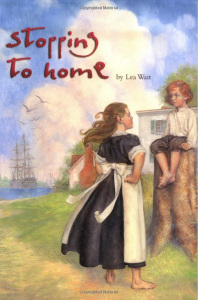 Lea: Although Joe is a real person, in all of my books the main characters (ages 11-15) are faced with major changes in their lives, and must make decisions as to what they’ll do, where they’ll live, who they’ll live with, etc … decisions which many people today don’t make until their twenties. Because of that, my books are different from some contemporary stories for children which focus on school days and friends. My characters have friends, but they may also have business partners, and they definitely have major responsibilities, for themselves and their families.
Lea: Although Joe is a real person, in all of my books the main characters (ages 11-15) are faced with major changes in their lives, and must make decisions as to what they’ll do, where they’ll live, who they’ll live with, etc … decisions which many people today don’t make until their twenties. Because of that, my books are different from some contemporary stories for children which focus on school days and friends. My characters have friends, but they may also have business partners, and they definitely have major responsibilities, for themselves and their families.
Children reading my books are often amazed at what was expected by young people in the past, but are also fascinated by it. (So are adults!)
Barb: You have two mystery series for adults. How is writing for young people different from writing for adults?
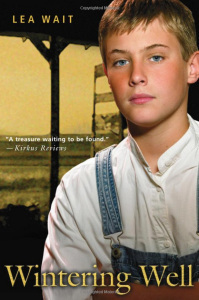 Lea: It’s not as different as you might think. There are a few “rules” – say, about the ages of the main characters in books for young people. And in middle grade fiction, which I write, there’s no swearing or sex. Of course – in cozy mysteries you have rules, too – you can’t hurt an animal or a child, and most violence and sex take place off-stage. So each genre has its framework.
Lea: It’s not as different as you might think. There are a few “rules” – say, about the ages of the main characters in books for young people. And in middle grade fiction, which I write, there’s no swearing or sex. Of course – in cozy mysteries you have rules, too – you can’t hurt an animal or a child, and most violence and sex take place off-stage. So each genre has its framework.
I don’t write down in my children’s books. I use whatever the (period-appropriate) words are, and my plots have included the middle passage from Africa, amputation, death of relatives and friends, and serious mental and physical disabilities. (Not all in one book!) In UNCERTAIN GLORY there are financial issues, a parent depressed after the death of a son, bullying, racial prejudice, and a twelve-year-old girl spiritualist who is being drugged by her uncle.
I don’t always deal with issues like that in my books for adults! I think authors (and parents) often under-estimate children. I’ve never heard of a child shocked by my books, but I know some parents and grandparents have been nervous about my subjects. I think sometimes we try to protect children too much. Think of what’s on the evening news!
Barb: A lot of people who don’t write for young people get confused by the categories. I understand picture books and chapter books, but help me through the thicket of juvenile, middle-grade, YA. Etc.
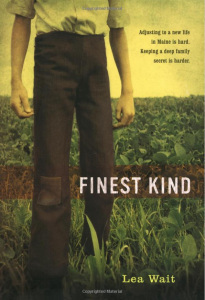 Lea: Okay! There are pictures books for every age group, up to adults. (What else is a coffee table book?) They start with board books, and gradually add words and pictures. Most picture books for the pre-school set today have under one thousand words. Chapter books also can be divided by reading level, but basically are books for early readers that look more grown up – fewer pictures than picture books, and the story divided into half a dozen or more chapters.
Lea: Okay! There are pictures books for every age group, up to adults. (What else is a coffee table book?) They start with board books, and gradually add words and pictures. Most picture books for the pre-school set today have under one thousand words. Chapter books also can be divided by reading level, but basically are books for early readers that look more grown up – fewer pictures than picture books, and the story divided into half a dozen or more chapters.
I write middle grade fiction, which are the classic “children’s books,” aimed at ages 8-14. They’re a little shorter than books for adults (30,000-45,000 words) and the main characters are usually aged 11-14. Young Adults, or YA books, have main characters aged 15-19, and more words. If the characters are older than nineteen, the books are now categorized as “New Adult.”.
In reality – a lot of YA and NA and even middle grade fiction is bought and read by adults, and children choose books by a combination of their reading abilities and their interests – just as they always have.
Barb: How is selling a book for young people to a publisher different than selling a series for adults? How is supporting the book post-publication different?
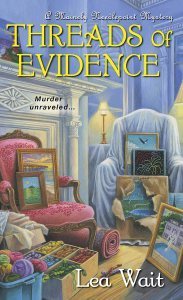 Lea: Wow. In lots of ways. First, most agents specialize; few agents place both books for adults and books for children. So you need to have an agent who knows the current marketplace in your genre. Second, in my experience books for children are edited much more closely than books for adults. Perhaps because of the time that takes, the time from selling a book until it’s published is longer than for adult books — for picture books (which are written by one person and illustrated by another) it can take five or six years until publication. For other books, two years is probably the average.
Lea: Wow. In lots of ways. First, most agents specialize; few agents place both books for adults and books for children. So you need to have an agent who knows the current marketplace in your genre. Second, in my experience books for children are edited much more closely than books for adults. Perhaps because of the time that takes, the time from selling a book until it’s published is longer than for adult books — for picture books (which are written by one person and illustrated by another) it can take five or six years until publication. For other books, two years is probably the average.
Different book reviewers look at books for children, and, just as there are mystery book stores, there are stores that specialize in children’s books. Most hard-cover books (and some soft covers) for children are purchased by town and school libraries; most parents can’t afford to buy their children stacks of new books, and depend on libraries. For that reason, having a children’s book re-published in a book club (with an inexpensive soft cover) is important for sales. Many authors make visits to classrooms to talk about their books, about being an author, and about how students can improve their research and writing skills. I’ve been doing more Skype visits in the past couple of years, too.
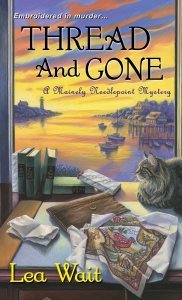 Barb: What are you working on now?
Barb: What are you working on now?
Lea: I just finished the third book in my Mainely Needlepoint series, THREAD AND GONE, which will be published next January. (The second in the series, THREADS OF EVIDENCE, will be out in August.) I’m working on the eighth in the Shadows series. And I’m hoping to get back to one of the two books for young people that seem to be perpetually “in progress”. Not bored!
Barb: Wow. Certainly not. Good luck at the Agathas, Lea! We’ll see you at Malice.
Readers, how about you? What do you enjoy in a children’s or young adult novel? Anyone else have ambitions to write one?
Filed under: Guest posts Tagged: Agatha award, Books for children, Middle grade books, Uncertain Glory, Wiscasset Maine, Young adult books

April 24, 2015
Cook Like a Mystery Writer
Edith here, getting ready for the Newburyport Literary Festival tomorrow (with Jessie and 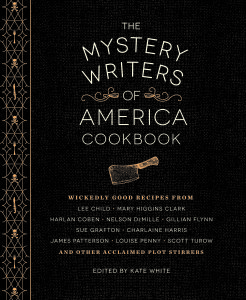 Liz), and Malice soon after!
Liz), and Malice soon after!
Mystery Writers of America and Quirk Books recently published a gorgeous hardcover cookbook, edited by Kate M. White. It includes scrumptious recipes from luminary Sisters in Crime like Katherine Hall Page, Louise Penny, Sue Grafton, and Sara Paretsky; authors like Lee Child, Joe Finder, and Harlan Coben; and best-selling writer pals of ours like Hallie Ephron, Hank Phillippi Ryan, Wicked Cozy Accomplice Sheila Connolly, and Leslie Budewitz. Barb and I each have a recipe in the book, too!
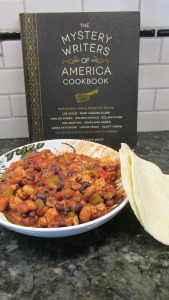 I made Charlaine Harris’s Very Unsophisticated Supper Dip last Saturday and it was delicious. I modified Charlaine’s recipe, adding fresh red and green peppers, and we ate it with warmed fresh corn tortillas instead of tortilla chips. It was a fabulous cozy dinner in front of a movie. So far I’ve also made Barb Ross’s recip
I made Charlaine Harris’s Very Unsophisticated Supper Dip last Saturday and it was delicious. I modified Charlaine’s recipe, adding fresh red and green peppers, and we ate it with warmed fresh corn tortillas instead of tortilla chips. It was a fabulous cozy dinner in front of a movie. So far I’ve also made Barb Ross’s recip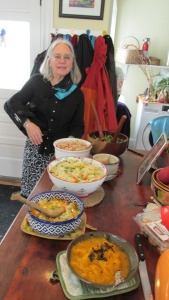 e, invented by her husband Bill Carito, a fabulous Lobster-Pesto Risotto that was perfect for our Easter brunch (somehow I failed to get a closeup of the dish, but it was a big hit with our guests).
e, invented by her husband Bill Carito, a fabulous Lobster-Pesto Risotto that was perfect for our Easter brunch (somehow I failed to get a closeup of the dish, but it was a big hit with our guests).
I’m running a contest to give away a copy of the cookbook. All you have to do is leave a comment over on the contest link on my web site (http://edithmaxwell.com/mwa-cookbook-contest/) before sundown tonight, Friday April 24! Or heck, a comment here will enter you, too!
Readers: Hungry yet? What author do you hope you’ll find in the cookbook? Have you tried any of the recipes yet?
Filed under: Contests, Edith's posts Tagged: Bill Carito, Charlaine Harris, giveaway, Hallie ephron, Lobster Risotto, MWA Cookbook, Mystery Writers of America

April 23, 2015
Favorite Malice Moments
 We are very excited that Malice Domestic 2015 is just one week away, and it’s in its twenty-seventh year! So today we will share some of our favorite Malice moments — take it away, Wickeds.
We are very excited that Malice Domestic 2015 is just one week away, and it’s in its twenty-seventh year! So today we will share some of our favorite Malice moments — take it away, Wickeds.
Edith: Wow. So many favorite moments. I roomed with Sherry my first Malice, and stayed at her home the night before and the night after (watching the royal wedding on TIVO, I might add). I didn’t have a book out yet, but I loved being immersed in all those authors and all those fans! In 2013, I was a debut author with Speaking of Murder, and hosted a table at the New Authors’ Breakfast. What a treat to have Catriona McPherson at my table – Catriona w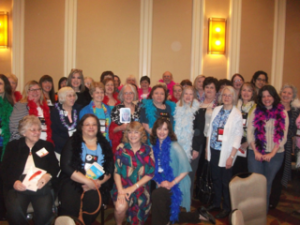 ho had just won an Agatha award the night before. Afterwards she pulled me aside and said she also held a PhD in linguistics. Man, this debut author was SO delighted. Then last year at the Sisters in Crime breakfast, the number of Guppies present, most wearing boas, took two photographs to capture us all. But this year, being an Agatha nominee for Best Short Story? I’m not sure I’ll be able to handle the excitement! At least I’ll have my lifeboat with me – the other five core Wickeds and all three of our Accomplices, too.
ho had just won an Agatha award the night before. Afterwards she pulled me aside and said she also held a PhD in linguistics. Man, this debut author was SO delighted. Then last year at the Sisters in Crime breakfast, the number of Guppies present, most wearing boas, took two photographs to capture us all. But this year, being an Agatha nominee for Best Short Story? I’m not sure I’ll be able to handle the excitement! At least I’ll have my lifeboat with me – the other five core Wickeds and all three of our Accomplices, too.
Barb: My favorite Malice moment involves a core group of the Wickeds and accomplices. My first book, The Death of an Ambitious Woman, was published in hardcover by a small press. Of course, I was thrilled to be on a panel at Malice and to have a signing. HOWEVER, at the signing, I was seated next to Maggie Sefton, who had a line that trailed off the signing platform, down the stairs and out into the lobby. Some of the Wickeds–Sherry, Kim & Edith–loyally went through my signing line–even though they already had my book. Then, they took one look at me sitting all alone while Maggie Sefton signed and signed–and they went through my line again! And again! Such loyalty. Such sisterhood.
Edith: Aw, total no brainer, Barb! And what goes around, comes around.
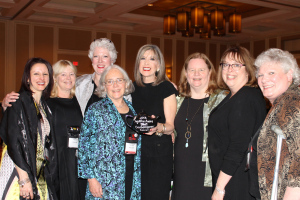 Julie: At the risk of being a sap, my favorite Malice moment was that I met Sherry Harris. I was at the banquet, and was the table host. Sherry was seated at my table. If you have had the pleasure of meeting Sherry, you know that she is one of the loveliest people around. She mentioned that she was moving to Massachusetts, I told her to join Sisters in Crime, and the rest is history. I have many wonderful Malice moments (it is a great conference), but I suspect that sitting at the banquet with Sherry this year will be another one–so happy for my friend, and her well deserved Agatha nomination for Best First.
Julie: At the risk of being a sap, my favorite Malice moment was that I met Sherry Harris. I was at the banquet, and was the table host. Sherry was seated at my table. If you have had the pleasure of meeting Sherry, you know that she is one of the loveliest people around. She mentioned that she was moving to Massachusetts, I told her to join Sisters in Crime, and the rest is history. I have many wonderful Malice moments (it is a great conference), but I suspect that sitting at the banquet with Sherry this year will be another one–so happy for my friend, and her well deserved Agatha nomination for Best First.
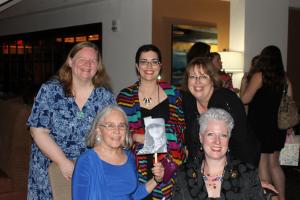 Liz: Last year was my very first Malice (unless you count the prior year when I went on a stick) and all I remember is what a whirlwind it was! Kneading to Die was a best first Agatha nominee, so it was like induction by fire. All the Wickeds being there together was awesome and so much fun. Meeting some readers who are regulars on my Facebook page was very cool too. I can’t wait for this year!
Liz: Last year was my very first Malice (unless you count the prior year when I went on a stick) and all I remember is what a whirlwind it was! Kneading to Die was a best first Agatha nominee, so it was like induction by fire. All the Wickeds being there together was awesome and so much fun. Meeting some readers who are regulars on my Facebook page was very cool too. I can’t wait for this year!
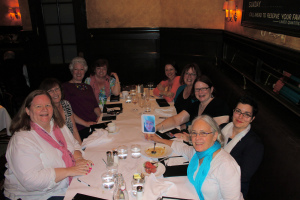 Jessie: My favorite moment occurred last year when I was able to thank Dorothy Cannell for being so kind to me when I met her years earlier at an author event in Maine. I stepped up to the front of her book signing line to ask her to autograph her latest mystery and then managed to gather all my courage in two hands and choke out the news that I had written some books of my own. She was, of course, gracious, and generously asked me to autograph one of my books for her. I was so touched! I think one of the very best things about the mystery community is how supportive and kind everyone is to each other.
Jessie: My favorite moment occurred last year when I was able to thank Dorothy Cannell for being so kind to me when I met her years earlier at an author event in Maine. I stepped up to the front of her book signing line to ask her to autograph her latest mystery and then managed to gather all my courage in two hands and choke out the news that I had written some books of my own. She was, of course, gracious, and generously asked me to autograph one of my books for her. I was so touched! I think one of the very best things about the mystery community is how supportive and kind everyone is to each other.
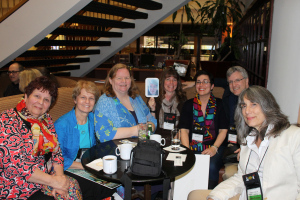 Sherry: I went to my first Malice in 2003 so I have a lot of favorite moments! In 2004 I was checking in at the same time as an agent and she told me to send her my manuscript. I did and it was rejected but still… And who can forget the year Louis Farrakhan was staying at the same hotel! As Julie said our meeting was momentous and life changing for me in so many ways. I blogged about it when I talked about the importance of networking. I’ve met so many wonderful people at Malice and that is really the best part about going. Last year I moderated my first panel — that was so much fun — thank you Barb Goffman for trusting me with the Here Comes the Corpse panel! It will seem as if my Malice life has come full circle having Julie next to me at the banquet this year. Being nominated for an Agatha Award is like the icing on the Malice cake for me.
Sherry: I went to my first Malice in 2003 so I have a lot of favorite moments! In 2004 I was checking in at the same time as an agent and she told me to send her my manuscript. I did and it was rejected but still… And who can forget the year Louis Farrakhan was staying at the same hotel! As Julie said our meeting was momentous and life changing for me in so many ways. I blogged about it when I talked about the importance of networking. I’ve met so many wonderful people at Malice and that is really the best part about going. Last year I moderated my first panel — that was so much fun — thank you Barb Goffman for trusting me with the Here Comes the Corpse panel! It will seem as if my Malice life has come full circle having Julie next to me at the banquet this year. Being nominated for an Agatha Award is like the icing on the Malice cake for me.
Readers: Any favorite Malice moments of your own? How about questions on the order of, “What the heck is Malice? And what do you do there?”
Filed under: Group posts Tagged: Agatha awards, Best First Novel, Book signings, Catriona McPherson, Dorothy Cannell, Favorite Malice Moments, Maggie Sefton, Malice Domestic, networking, New Authors Breakfast

April 22, 2015
Wicked Wednesday — Earth Day
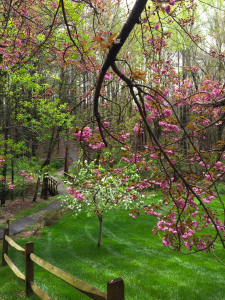 By Sherry, enjoying all of the flowering trees in northern Virgina
By Sherry, enjoying all of the flowering trees in northern Virgina
As I was setting up this post I realized I didn’t know a lot about the history of Earth Day so here is a little information from the earthday.org website:
The idea came to Earth Day founder Gaylord Nelson, then a U.S. Senator from Wisconsin, after witnessing the ravages of the 1969 massive oil spill in Santa Barbara, California. Inspired by the student anti-war movement, he realized that if he could infuse that energy with an emerging public consciousness about air and water pollution, it would force environmental protection onto the national political agenda. Senator Nelson announced the idea for a “national teach-in on the environment” to the national media; persuaded Pete McCloskey, a conservation-minded Republican Congressman, to serve as his co-chair; and recruited Denis Hayes as national coordinator. Hayes built a national staff of 85 to promote events across the land.
To find out more about the history of Earth Day click on this link.
So Wickeds what do you do to help preserve our environment?
Jessie: When my husband and I bought our first house twenty years ago we started
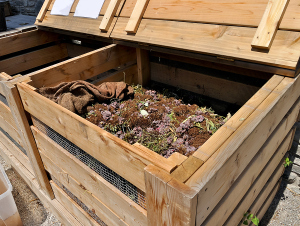 composting everything we possibly could. Not only has that helped the environment by reducing our weekly garbage volume by at least half, it has yielded such a wonderful amendment for our garden beds. I hope that by raising our kids with the composting habit, they will do the same in their own households one day.
composting everything we possibly could. Not only has that helped the environment by reducing our weekly garbage volume by at least half, it has yielded such a wonderful amendment for our garden beds. I hope that by raising our kids with the composting habit, they will do the same in their own households one day. Edith: I do as much as I can except turn the water off while I’m brushing my teeth. We compost all food scraps except meat and recycle everything possible, resulting in one small grocery bag of actual trash every week. I use rain barrel water for the garden, print drafts on the back of previously printed drafts, and drive a Prius with very conservative driving habits. I walk everywhere within a mile of home.
Edith: I do as much as I can except turn the water off while I’m brushing my teeth. We compost all food scraps except meat and recycle everything possible, resulting in one small grocery bag of actual trash every week. I use rain barrel water for the garden, print drafts on the back of previously printed drafts, and drive a Prius with very conservative driving habits. I walk everywhere within a mile of home.We
 super-insulated our walls and ceilings and installed an efficient gas boiler and an on-demand water heater. On the other hand, I refuse to sit around my house with a hat and mittens on in the winter, so we do turn the thermostat up to 70. But see item about insulation… I’m sure I could do more, like ride my bike everywhere within five miles, or capture warming-up shower water for the garden or toilet. I have my limits, though. And I live in a very hilly town. Now if I lived in California…
super-insulated our walls and ceilings and installed an efficient gas boiler and an on-demand water heater. On the other hand, I refuse to sit around my house with a hat and mittens on in the winter, so we do turn the thermostat up to 70. But see item about insulation… I’m sure I could do more, like ride my bike everywhere within five miles, or capture warming-up shower water for the garden or toilet. I have my limits, though. And I live in a very hilly town. Now if I lived in California…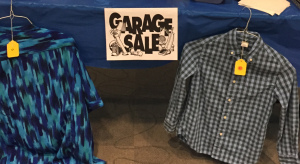 Sherry: It will surprise no one that I think garage sales are one of the best way to recycle things. If you don’t like garage sales it’s easy to contact a charitable organization to come pick up things you don’t want anymore. Or you can take them to your favorite thrift shop. Nothing drives me more nuts (okay, my husband occasionally does) than seeing useable items set out on the curb for garbage. And, yes, I’ve rescued my share of things from the curb.
Sherry: It will surprise no one that I think garage sales are one of the best way to recycle things. If you don’t like garage sales it’s easy to contact a charitable organization to come pick up things you don’t want anymore. Or you can take them to your favorite thrift shop. Nothing drives me more nuts (okay, my husband occasionally does) than seeing useable items set out on the curb for garbage. And, yes, I’ve rescued my share of things from the curb.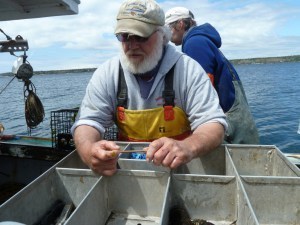
Captain Clive Farrin explains how to measure the lobster. In Maine legal lobsters must be between 3 1/4 and 5 inches long on the carapace (from the eye socket to the start of the tail). Larger and smaller lobsters must be thrown back.
Barb: I can’t say we do anything extraordinary. We’re regular recyclers and our Massachusetts house is very efficient having been totally gutted and rebuilt ten years ago. We drive a small, fuel-efficient car. But all that just seems like common sense in cold, densely-populated New England. So instead, let me talk lobsters. I did a lot of research about lobsters and lobstermen (which is what they are called, even when they are women) for Musseled Out, the Maine Clambake book that comes out next week. I came away so impressed. The lobstermen of Maine take huge responsibility for the fishery. They’ve watched fish stocks collapse around them and they know the consequences to their living if it happens with lobsters. They can’t and don’t take lobsters that are too small or too big, and if they catch an egg-bearing female, she is notched with a V on her tail, so she can’t be taken even when she isn’t bearing eggs. The lifecycle of lobsters is complicated and poorly understood. The tiniest hatchlings (super lobsters) can drift for miles and miles before they settle on the bottom. As a result, the lobstermen and the Federal government have had many disagreements about how to preserve the fishery. But the lobstermen, who are all small businessmen, not corporations running giant ships, and who observe the fishery daily, have been consistently right. Now they are under threat from things far beyond their control–the warming and increasing acidity of the North Atlantic. Already the lobsters have moved northward and the shell disease that has devastated southern New England has crept into Maine. We’ll see what happens.
Julie: My house is energy efficient, I recycle, and I try to get foods and products that are good for the environment. But the biggest thing I do is that I rarely drive. I live in Somerville, so I get places by taking buses and trains. And I walk. A lot. Over 10,000 steps a day on average. I have not made the car free leap yet. but I drive under 4000 miles a year.
Liz: We’re big recyclers too. I wish I could say I didn’t have to drive much, but I do. I try to do little things, like pick up trash when I’m out walking, or participate in volunteer projects through my work to help beautify local parks or other areas.
Readers, what do you do to conserve the environment? How will you celebrate Earth Day?
Filed under: Wicked Wednesday Tagged: composting, Earth Day, garage sales, lobsters, musseled out, Prius, recyling


